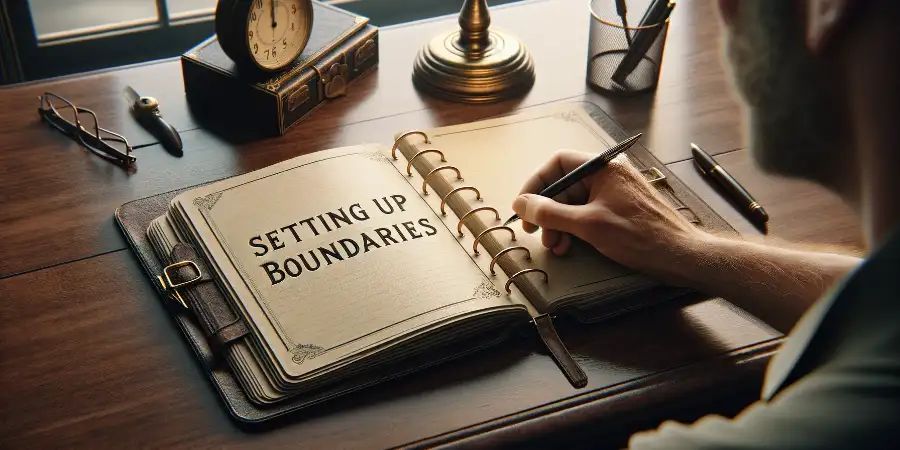Healthy boundaries are essential for happy, fulfilling relationships. This article is all about understanding what boundaries are, why they matter, and how to set them effectively.Whether with family, friends, or partners, setting clear boundaries is crucial for mutual respect and understanding. By mastering this skill, we can enhance our connections with others, ensuring that every relationship is built on a foundation of respect and care.Let’s explore how setting the right boundaries can lead to healthier and more joyful interactions.
What are boundaries?
Boundaries in relationships are like invisible lines that we draw around ourselves. They are the limits and rules we set for ourselves and others. Think of them like rules in a game; they help everyone know what is okay and what is not. Boundaries can be about our feelings, our personal space, our belongings, and our needs.
Think of setting boundaries in relationships like drawing a circle around yourself. This circle represents your personal space, your feelings, and your needs. It’s not about building a wall to keep others out, but more about drawing a gentle line that helps others understand how to treat you with respect and kindness.
You know, boundaries are like saying, ‘This is what I’m okay with, and this is what I’m not.’ It’s about knowing yourself well enough to say ‘yes’ to what feels right and ‘no’ to what doesn’t. And it’s not just about setting them; it’s also about respecting the boundaries of others.
When we set healthy boundaries, we teach others how to love and respect us in the way we want and need. It’s like giving them a manual to the best ways to be our friend, family member, or partner. And when everyone knows and respects each other’s boundaries, relationships just feel easier and more joyful.
So, setting up healthy boundaries? It’s really about understanding and communicating our limits lovingly. It’s a way of nurturing our relationships and making sure they grow in a healthy, respectful way.
What bad boundaries look like?
Alright, let’s chat about what it looks like when boundaries aren’t really there, or they’re too weak. Imagine you’re at a coffee shop with that same friend, diving deeper into the topic.

- Saying Yes When You Want to Say No: Picture this: your friend keeps asking you for favors, and you always say yes, even when you’re exhausted or busy. You’re afraid of hurting their feelings or being seen as unhelpful. This is a classic example of a weak boundary.
- Feeling Responsible for Others’ Feelings: Think about times when you feel like you have to make sure everyone around you is happy, even if it means putting your own feelings aside. If you’re constantly walking on eggshells, worrying about how others feel, that’s a sign your boundaries might be too porous.
- Over-sharing or Under-sharing: You know those moments when you either spill your deepest secrets to someone you just met or keep everything bottled up inside? Both can be signs of boundary issues – oversharing can leave you feeling exposed, while under-sharing can build walls that keep others out.
- Difficulty Making Decisions: If you’re always looking to others to make choices for you, or you feel like your opinions are swayed easily, it could mean your personal boundaries need some strengthening.
- Accepting Disrespectful Behavior: Imagine you have a friend who often makes jokes at your expense. It makes you uncomfortable, but you laugh along or stay silent because you don’t want to cause a scene or seem overly sensitive. Tolerating disrespect, even in a seemingly small form, is a sign of a weak boundary.
- Neglecting Your Own Needs: Think about those times when you’re so busy helping others or meeting their demands that you forget to take care of yourself. You might skip meals, lose sleep, or forgo your hobbies. Consistently putting others’ needs before your own can be a symptom of porous boundaries.
- Difficulty Expressing Disagreement: Consider situations where you agree with someone, even when you actually don’t, just to avoid conflict or to be liked. This could happen in a group setting, at work, or in personal relationships. If you’re habitually suppressing your true opinions, it’s a boundary issue.
- Allowing Intrusions into Personal Time: Imagine your phone buzzing late into the night with messages from colleagues, friends, or family, expecting immediate responses. If you feel obligated to be constantly available, even at the cost of your relaxation or sleep, it’s a sign of weak boundaries.
- Failing to Speak Up for Yourself: If you often find yourself in situations where you’re treated unfairly or your needs are ignored, and yet you struggle to voice your concerns or stand up for yourself, this indicates a boundary issue.
- Financial Boundaries Being Crossed: This could look like constantly lending money to friends or family, even when it puts your own financial stability at risk, or feeling pressured to pick up the tab more often than is comfortable for you.
And the Consequences?
Without clear boundaries, things can get pretty tangled.
- You might feel drained or taken advantage of, like you’re giving too much and not getting enough in return.
- Relationships can become one-sided, where one person’s needs overshadow the other’s.
- There’s also a risk of losing your sense of self. You might start to wonder, ‘Who am I, outside of what everyone else needs me to be?’
- And let’s not forget, it can lead to resentment and frustration, which are like slow-burning fires in any relationship.
Just like in a dance, if you don’t know your steps, you might step on someone’s toes or get stepped on. Setting and respecting boundaries is like learning the right steps, so the dance of relationships is more harmonious and enjoyable.
Discovering Your Limits – Reflecting on Personal Boundaries
Let’s take a good, honest look at how you handle your space, your feelings, and your relationships. Sometimes, we don’t even realize where we stand until we really think about it. So, here are some questions to help you figure out your current boundary settings:

- How Do I React When Someone Criticizes Me?
Reflect on your response to criticism. Do you get defensive, try to understand, or completely shut down? - What Happens When Someone Asks Me for a Favor?
Do I Say Yes Even When I Don’t Want To? Consider your inclination to agree to favors. Are you comfortable saying no, or do you often find yourself agreeing out of obligation or guilt? - How Do I Feel About Sharing Personal Information?
Think about your comfort level with sharing personal details. Are you an open book or more reserved, and how does this align with your comfort zone? - Do I Feel Guilty When I Take Time for Myself?
Assess feelings of guilt associated with self-care. Do you allow yourself personal time without feeling selfish, or is there a sense of unwarranted guilt? - How Do I Handle Uncomfortable Situations?
Think about how you react when you’re in a situation that makes you uncomfortable. Do you speak up, or do you tend to stay quiet and endure it? - What Are My Reactions When Someone Oversteps My Personal Space or Ignores My Preferences?
Reflect on how you respond when someone disregards your personal space or preferences. Are you assertive in such situations, or do you find it difficult to express your discomfort? - How Often Do I Compromise My Values to Accommodate Others?
Consider the frequency with which you bend your own rules or values to please others. Does this happen often, and how does it make you feel? - Do I Often Feel Overwhelmed by Others’ Demands?
Think about whether you feel a sense of overwhelm or exhaustion from trying to meet the needs and demands of those around you. - How Comfortable Am I with Saying ‘No’?
Gauge your level of comfort with refusing requests or invitations. Is saying ‘no’ a struggle for you? - Do I Regularly Adjust My Plans to Suit Others? Reflect on how often you change your plans or cancel your commitments to accommodate someone else’s schedule or preferences.
- How Willing Am I to Ask for Help When I Need It?
Consider your willingness to ask for support or assistance. Do you hesitate to reach out when you need it? - Do I Frequently Take Responsibility for Others’ Problems?
Think about if you often find yourself taking on the issues or emotions of others, even when it’s not your responsibility. - Do I Feel Valued and Respected in My Relationships?
Assess whether you feel appreciated and respected in your relationships, or if you often feel taken for granted. - How Often Do I Prioritize Self-Care and Activities for My Own Well-Being?
Reflect on how frequently you engage in activities that are solely for your own well-being and happiness.
Establish Healthy Boundaries
Setting boundaries is a crucial skill for nurturing positive relationships and safeguarding your emotional well-being. This section will offers a step-by-step guide to help you establish healthy boundaries effectively, along with tips on being assertive while maintaining respect for others.

Step-by-Step Guide to Setting Up Boundaries
- Identify Your Needs and Limits
Understanding your needs and limits is the foundational step in setting boundaries. Reflect on what makes you feel comfortable, respected, and valued in various aspects of your life. Consider situations or behaviors that trigger discomfort or stress. By recognizing these emotions, you gain clarity on where boundaries are needed. - Define Your Boundaries Clearly
Once you’ve identified your boundaries, it’s essential to articulate them clearly. Ambiguity can lead to misunderstandings. Use simple and direct language to express your boundaries. For instance, instead of saying, “I prefer not to be interrupted when I’m working,” you can say, “Please, I’d appreciate it if I’m not interrupted during work hours.” - Communicate Effectively
Effective communication is key to boundary-setting. Choose the right time and place to discuss your boundaries with others. Be calm and composed when expressing your needs. Utilize “I” statements to avoid sounding accusatory. For example, say, “I feel overwhelmed when there’s too much on my plate,” instead of, “You’re overwhelming me.” - Practice Self-Validation
It’s common for people to feel guilty or selfish when setting boundaries. Remember that boundaries are a sign of self-respect and self-care. Practice self-validation by reminding yourself that it’s perfectly okay to prioritize your well-being and comfort. - Establish Consequences
In some cases, it may be necessary to define consequences for boundary violations. Clearly communicate what will happen if someone repeatedly disregards your boundaries. Consequences should be reasonable and proportionate to the situation. For instance, “If you continue to disrespect my boundaries, I may need to limit our interactions.”
Tips on Being Assertive Yet Respectful
- Be Direct yet Kind
Assertiveness doesn’t require aggression. You can assert your boundaries firmly and directly while maintaining kindness and respect. It’s about confidently expressing your needs without belittling others. - Listen as Much as You Speak
Effective communication is a two-way street. When you assert your boundaries, be open to hearing others’ responses and perspectives. Listening actively can lead to better mutual understanding and compromise. - Use Non-Verbal Communication
Your body language, tone of voice, and facial expressions also convey assertiveness. Maintain eye contact, use a steady tone, and avoid defensive gestures when asserting your boundaries. - Stay Calm
Maintaining composure is essential when asserting boundaries. If you start to feel upset during a boundary-setting conversation, it’s okay to take a moment to breathe and collect your thoughts. Staying calm helps ensure that the discussion remains respectful and productive.
Navigating Boundary Challenges
Setting and maintaining boundaries in your relationships is an important step toward fostering mutual respect and understanding. However, it’s essential to anticipate and address the challenges that may arise when you establish these boundaries

Dealing with Resistance or Negative Reactions
Expect that not everyone will immediately respect your boundaries. Some individuals may resist or react negatively. Prepare yourself mentally for this possibility and stay firm in your decisions. Remember that your boundaries are vital for your well-being.
Explain Your Reasoning
Sometimes, explaining why a particular boundary is important to you can help others understand and respect it better. Sharing your reasoning can create empathy and build a stronger foundation for mutual respect.
Stay Committed
Consistency is key to boundary-setting success. The more consistently you stick to your boundaries, the more others will recognize and eventually respect them. Your commitment to your boundaries reinforces their importance.
Balancing Flexibility and Firmness
Know When to Be Flexible
While firm boundaries are crucial for your well-being, there are situations where flexibility can be beneficial. Recognize when it’s appropriate to bend your boundaries slightly without compromising your core values and needs.
But Stay Firm Where It Matters
For non-negotiable boundaries that are crucial for your emotional and physical well-being, stay firm. These boundaries are essential for maintaining self-respect and a healthy balance in your relationships.
In conclusion, setting healthy boundaries is essential for nurturing respectful and fulfilling relationships. By following this comprehensive guide and practicing assertiveness with kindness and respect, you can establish boundaries that support your well-being and promote healthy interactions with others. Remember that boundary-setting is a skill that can be developed over time, leading to stronger and more respectful relationships.
Staying True to Your Boundaries
Saying ‘no’ is not just about setting boundaries; it’s a powerful act of self-care and self-respect.

How to Stay on Top of Your Boundaries
- Check Yourself: Regularly think about your boundaries. Are they still good for you? Sometimes, they might need a little change, and that’s okay.
- Talk About It: If you change your boundaries, tell people who need to know. It’s like letting them know the new rules of your game.
- You Matter: Remember, your boundaries show that you respect and value yourself. You’re worth this effort!
Self-Care and Growing
- Take Care of You: Looking after yourself helps keep your boundaries strong. It’s like building a wall that keeps you safe and confident.
- Grow With Your Boundaries: As you change, your boundaries might too. It’s a normal part of getting to know yourself better.
Boundaries in Relationships
- Romantic Partners: Talk openly with your partner. Share what you need and listen to their boundaries too.
- Family: Family can be tough, but you’ve got to be clear about what you’re okay with, like how you spend your time and what you value.
- Friends: Choose friends who respect your limits. Be clear about what you can give in terms of time and energy.
- Work: At your job, set clear limits about your work hours and tasks. Speak up if you need to.
When to Get Help
If life feels overwhelming, and setting boundaries seems impossible, it’s okay to seek help. Recognizing when you need support is a sign of self-awareness and self-care. Look for professionals like therapists or counselors who specialize in boundary-setting and personal development. They can provide valuable guidance on your journey. There are loads of great books and online resources about setting boundaries. These can offer helpful insights and practical strategies.
In a nutshell, maintaining boundaries is all about taking care of yourself and your relationships. It’s a journey that can lead to a happier and more balanced life. Remember, it’s a skill you can master over time, and it’s worth every effort for your well-being and the quality of your connections with others. So go ahead, embrace those boundaries and live your best life!

0 Comments